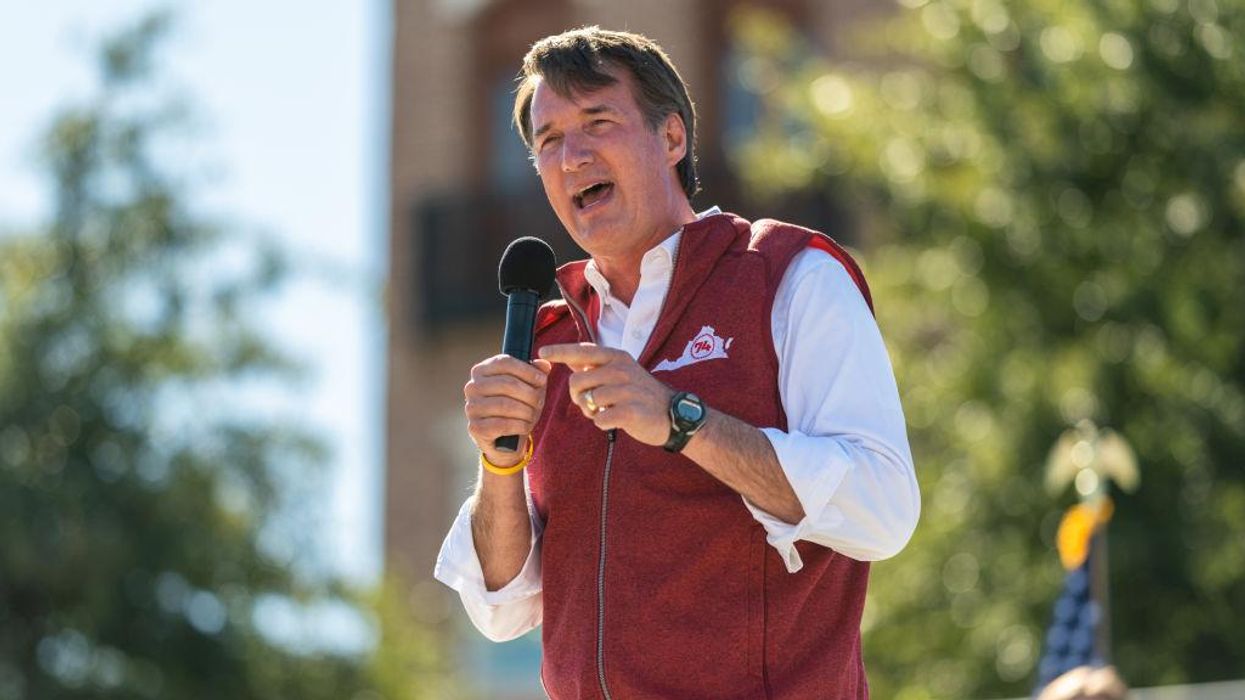
Elijah Nouvelage/Getty Images

In a departure from his Democratic predecessor, Virginia Gov. Glenn Youngkin (R) is calling on state lawmakers to repeal a mandate that ties Virginia's clean car standards to whatever the climate alarmists in California adopt in their state.
Youngkin on Monday released a 2022 energy plan that asks legislators to revise the Virginia Clean Economy Act, a 2020 law enacted passed by state Democrats that's designed to eliminate fossil fuel-generated electricity in Virginia within the next three decades. The law, which was signed by Gov. Ralph Northam (D), has required increased investment in solar and wind power and put forward green energy regulations that Youngkin says have damaged the economy.
"The plan adopted in recent years by the previous administration goes too far in establishing rigid and inflexible rules for the transition in energy generation in Virginia," Youngkin wrote in a letter accompanying his energy plan. "We first must embrace a measure of humility as to our ability to project and predict 30-years of energy demand and technological innovation. And we certainly should not make irreversible decisions today to exit critical elements of power stack."
The governor's plan calls for an "all of the above" approach that includes natural gas, nuclear energy, and renewable resources to reduce reliance on fossil fuels without making energy too expensive for Virginia customers. It places strong emphasis on nuclear energy and calls for the construction of a commercial small modular nuclear reactor in Southwest Virginia within 10 years.
Youngkin's plan also urges lawmakers to repeal another law passed in 2021 that requires Virginia's vehicle standards to match those passed by the California Air Resources Board, which in August finalized rules that would ban the sale of gas-powered vehicles in the state by 2035.
The plan says California's vehicle standards "eliminate consumer choice" and will "put significant strains on Virginia's grid." It cites an estimate from the Weldon Cooper Center at the University of Virginia that projects electricity demand to increase as much as 25% by 2035 under the Zero Emission Vehicle Standard. Relying solely on "intermittent" solar and wind power to meet this increase in electricity demand would be a "disastrous combination," according to the plan.
"California, which is now asking drivers to refrain from charging their electric vehicles to prevent blackouts, provides an instructive example of what banning non-electric vehicle sales and retiring all baseload generation would look like in Virginia," the plan states. In late August, California energy managers advised state residents to refrain from charging electric vehicles so that the power grid would not be overwhelmed during a record heat wave.
The energy plan received mixed reaction from lawmakers. Democrats and environmental activists slammed the proposal as a step backward for Virginia.
“The misguided call to repeal Clean Cars standards would scrap the biggest step Virginia has taken to address the largest source of climate pollution,” said Trip Pollard, a senior attorney with the Southern Environmental Law Center. “The plan doubles down on the misinformation campaign the administration is mounting against Clean Cars and would hit the snooze button on transportation electrification.”
State Sen. Scott Surovell (D) observed in a tweet that Virginia's commitment to carbon-free energy was one of the factors that led the Lego Corp. to build a new $1 billion factory in Chesterfield County.
"Youngkin for President is going to single-handedly destroy our VA's business climate in its zeal to make headlines," Surovell charged, referring to speculation that Youngkin harbors presidential ambitions for 2024.
State Republicans welcomed the emphasis on nuclear energy.
“I am thrilled that the 2022 Virginia Energy Plan recognizes Virginia’s unique nuclear advantage,” House Commerce and Energy Chair Delegate Kathy Byron, R-Lynchburg, said in a statement.
“Two of the nation’s largest nuclear manufacturing companies are located here in Lynchburg,” Byron continued. “They offer exciting opportunities to research and develop cutting-edge nuclear generation technologies that will create new, high-paying jobs in the Commonwealth while delivering reliable energy to Virginians. I am also glad Governor Youngkin’s plan includes actions to protect our natural resources, including farmland, rivers, and streams.”
However, there was bipartisan agreement on at least one aspect the proposal: reforms to a 2007 state law that allowed public utility companies to impose rate adjustment clauses, or riders, on consumer electric bills to cover the cost of certain projects. Youngkin proposes to restore the State Corporation Commission's power to review rates charged by power companies, which he says have led to more than a $30 increase in monthly power bills since the law was passed.
Democratic lawmakers said they would be open to considering rate reforms, but indicated the rest of the plan was unacceptable to them. Any energy reforms must advance through both the Virginia House of Delegates, which is controlled by a small Republican majority, and the state Senate, where Democrats have a slim majority. The next state legislative elections are scheduled for 2023.